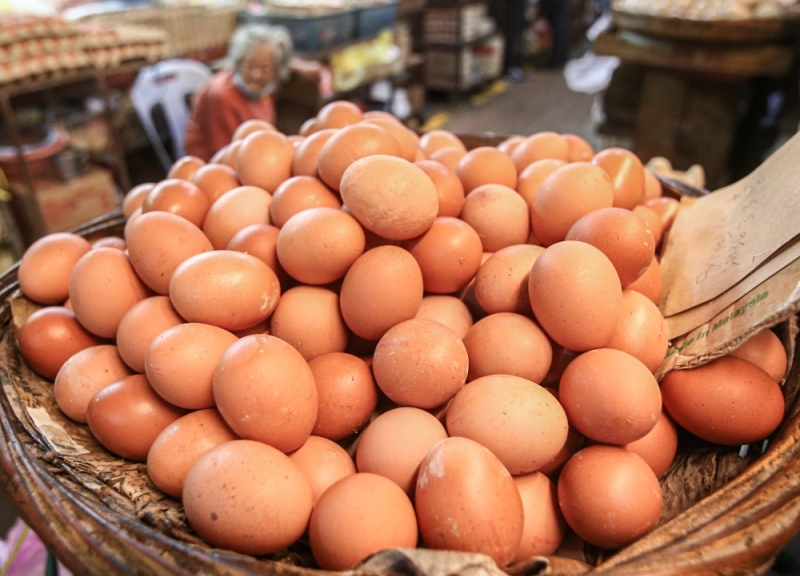MM:
Chicken, egg price float: With eight firms dominating, how will govt keep it affordable for B60? Charles Santiago asks

Charles Santiago said the shortage of chicken and eggs and the erratic prices have been hard on those in the bottom 60 per cent income tier. ― Picture by Farhan Najib
Thursday, 23 Feb 2023 10:30 AM MYT
KUALA LUMPUR, Feb 23 — Former Klang MP Charles Santiago today questioned how chicken and eggs can remain affordable for the B60 or those in the bottom 60 per cent income tier in Malaysia if the government removes the maximum selling price after June, given that just a few companies dominate production of these food items.
He called for transparency in the government’s removal of price controls or plan to float the prices of chicken and eggs.
“Given that eight firms control 65 per cent of production, how will the Ministry of Agriculture and Food Security (MAFS) ensure chicken and egg prices remain affordable to the B60 while also meeting self-sufficiency needs?
“As this dominance is alarming, the Malaysia Competition Commission should release its findings on cartel activities in the industry before the float is introduced, especially since the findings have been pending for too long now,” he said in a statement, without naming those eight companies.
“Given these concerns, shouldn’t MAFS make public its cost-benefit analysis, justifying a float system as the best alternative for Malaysia and explain how it works? And how it would protect the interests of independent and contract farmers, who are vulnerable at this time given the control by the cartel?” he added.

Former Klang MP Charles Santiago today questioned how chicken and eggs can remain affordable for the B60. ― Picture by Sayuti Zainudin
He highlighted that cartels signal the control of production resources that take a whack at independent and contract farmers and allegedly artificially create shortages to increase prices.
Welcoming Agriculture and Food Security Minister Datuk Seri Mohamad Sabu’s remarks about increasing local cultivation of grain and corn as chicken feed accounts for 75 per cent of the cost of producing chickens, Charles noted that the Selangor and Negeri Sembilan state governments have started such cultivation.
But he said the ministry must also explore other options such as palm kernel cake or black soldier larvae to be used as an alternative source to feed chickens in order to reduce production costs.
Pointing out that the public are already burdened by job and income losses especially following the Covid-19 pandemic, he said the shortage of chicken and eggs and the erratic prices have been hard on them.
“As such, transparency is key, and the responsibility is on the government to make all information public,” he concluded.
Currently, the government has imposed price controls to only allow the maximum retail selling price in peninsular Malaysia for chicken to be at RM9.40 per kg, and the highest allowed selling price for eggs to be at 45 sen (Grade A), 43 sen (Grade B) and 41 sen (Grade C).
The maximum selling price in Langkawi, Labuan, Sabah and Sarawak depends on the different zones and districts there.
Thursday, 23 Feb 2023 10:30 AM MYT
KUALA LUMPUR, Feb 23 — Former Klang MP Charles Santiago today questioned how chicken and eggs can remain affordable for the B60 or those in the bottom 60 per cent income tier in Malaysia if the government removes the maximum selling price after June, given that just a few companies dominate production of these food items.
He called for transparency in the government’s removal of price controls or plan to float the prices of chicken and eggs.
“Given that eight firms control 65 per cent of production, how will the Ministry of Agriculture and Food Security (MAFS) ensure chicken and egg prices remain affordable to the B60 while also meeting self-sufficiency needs?
“As this dominance is alarming, the Malaysia Competition Commission should release its findings on cartel activities in the industry before the float is introduced, especially since the findings have been pending for too long now,” he said in a statement, without naming those eight companies.
“Given these concerns, shouldn’t MAFS make public its cost-benefit analysis, justifying a float system as the best alternative for Malaysia and explain how it works? And how it would protect the interests of independent and contract farmers, who are vulnerable at this time given the control by the cartel?” he added.

Former Klang MP Charles Santiago today questioned how chicken and eggs can remain affordable for the B60. ― Picture by Sayuti Zainudin
He highlighted that cartels signal the control of production resources that take a whack at independent and contract farmers and allegedly artificially create shortages to increase prices.
Welcoming Agriculture and Food Security Minister Datuk Seri Mohamad Sabu’s remarks about increasing local cultivation of grain and corn as chicken feed accounts for 75 per cent of the cost of producing chickens, Charles noted that the Selangor and Negeri Sembilan state governments have started such cultivation.
But he said the ministry must also explore other options such as palm kernel cake or black soldier larvae to be used as an alternative source to feed chickens in order to reduce production costs.
Pointing out that the public are already burdened by job and income losses especially following the Covid-19 pandemic, he said the shortage of chicken and eggs and the erratic prices have been hard on them.
“As such, transparency is key, and the responsibility is on the government to make all information public,” he concluded.
Currently, the government has imposed price controls to only allow the maximum retail selling price in peninsular Malaysia for chicken to be at RM9.40 per kg, and the highest allowed selling price for eggs to be at 45 sen (Grade A), 43 sen (Grade B) and 41 sen (Grade C).
The maximum selling price in Langkawi, Labuan, Sabah and Sarawak depends on the different zones and districts there.
No comments:
Post a Comment